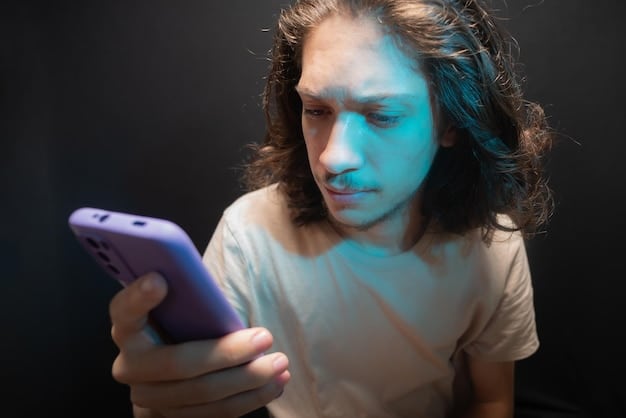Social Media Notifications and Teen Mental Health: A New Study

Recent updates from a new study reveal the profound impact of social media notifications on teenagers’ mental health, highlighting increased anxiety, depression, and disrupted sleep patterns linked to constant digital alerts.
In today’s digitally driven world, recent updates from a new study shine a light on the significant influence of social media notifications on the mental well-being of teenagers, raising important questions about mindful tech use.
Understanding the New Study on Teenagers and Social Media
The recent study has brought to the forefront a critical issue: the correlation between social media notifications and the mental health of teenagers. This research delves into how constant digital stimulation affects young minds.
The study highlights that the incessant barrage of notifications can lead to increased levels of stress, anxiety, and even depression among teenagers. It’s not just about the content of the notifications but the sheer volume and the expectation to respond immediately.

How Notifications Trigger Psychological Responses
Social media notifications are designed to grab our attention, and for teenagers, this can have a profound psychological impact. These alerts trigger a series of responses that can ultimately affect their mental health.
The constant expectation to check and respond to notifications can lead to a state of chronic stress. This is because the brain perceives these alerts as important, triggering the release of stress hormones like cortisol.
The Fear of Missing Out (FOMO)
One of the key drivers behind the anxiety caused by social media notifications is the Fear of Missing Out (FOMO). Teenagers worry that if they don’t respond immediately, they’ll miss out on important information or social opportunities.
The Dopamine Effect
Notifications also trigger the release of dopamine, a neurotransmitter associated with pleasure and reward. This can create a cycle of seeking out notifications, leading to addiction and dependence on social media.
- Constant checking can lead to anxiety and stress.
- FOMO drives the need to stay constantly connected.
- Dopamine release creates a cycle of addiction.
- Sleep patterns are disrupted by nighttime alerts.
In conclusion, the psychological responses triggered by social media notifications can have a detrimental effect on teenagers’ mental health. Recognizing these triggers is the first step in mitigating their impact.
The Impact on Sleep and Academic Performance
Beyond the immediate emotional responses, social media notifications can also have a significant impact on teenagers’ sleep patterns and academic performance. These factors are crucial for overall well-being and future success.
The blue light emitted by smartphones and other devices can interfere with the production of melatonin, a hormone that regulates sleep. This disruption can lead to insomnia and poor-quality sleep.

Strategies for Mindful Tech Use
Given the potential negative impacts of social media notifications, it’s essential for teenagers, parents, and educators to adopt strategies for mindful tech use. These strategies can help mitigate the harmful effects and promote a healthier relationship with technology.
One of the most effective strategies is to set specific times for checking social media and turning off notifications at other times. This allows teenagers to focus on other activities, such as schoolwork, hobbies, and socializing in person.
Turning Off Notifications
Simply turning off notifications can significantly reduce the constant stream of distractions and the associated anxiety. Most smartphones and social media apps offer options to customize notification settings.
Setting Time Limits
Using built-in features or third-party apps to set time limits for social media use can help teenagers manage their digital habits. This can prevent excessive use and promote a healthier balance.
Creating Tech-Free Zones
Establishing tech-free zones in the home, such as the bedroom or dining room, can encourage face-to-face interactions and better sleep habits. These zones can provide a much-needed break from digital stimulation.
- Turn off non-essential notifications.
- Set daily time limits for social media apps.
- Create tech-free zones at home.
- Encourage alternative activities and hobbies.
By implementing these strategies, teenagers can learn to use technology mindfully and reduce its negative impact on their mental health.
The Role of Parents and Educators
Parents and educators play a crucial role in helping teenagers navigate the digital world and develop healthy tech habits. Their guidance and support can make a significant difference in mitigating the harmful effects of social media notifications.
Parents can start by having open and honest conversations with their children about the potential risks of social media and the importance of balance. They can also model healthy tech habits themselves.
Educating Teenagers
Educating teenagers about the psychological effects of social media notifications can empower them to make informed decisions about their tech use. This education should include information about FOMO, dopamine, and the impact on sleep.
Setting Clear Expectations
Parents should set clear expectations about screen time and social media use, including specific times for turning off devices and engaging in other activities. These expectations should be age-appropriate and consistently enforced.
Providing Support
Offering emotional support and creating a safe space for teenagers to discuss their concerns about social media can help them cope with the pressures of digital connectivity. This support can include listening, validating their feelings, and seeking professional help if needed.
In conclusion, parents and educators have a vital role to play in promoting mindful tech use among teenagers. By educating, setting expectations, and providing support, they can help young people thrive in the digital age.
Seeking Professional Help When Needed
While mindful tech use and supportive relationships are essential, it’s also important to recognize when professional help is needed. If a teenager is experiencing significant distress or mental health challenges related to social media, seeking the guidance of a mental health professional is crucial.
Mental health professionals can provide evidence-based treatments, such as cognitive-behavioral therapy (CBT), to help teenagers manage their anxiety, depression, and other mental health concerns. They can also offer strategies for developing healthier coping mechanisms.
The Future of Social Media and Teen Mental Health
As social media continues to evolve, it’s essential to consider the future implications for teen mental health. Staying informed about emerging trends and technologies can help us proactively address potential challenges.
One area to watch is the development of more personalized and adaptive notification systems. These systems may use artificial intelligence (AI) to tailor notifications to individual users, potentially reducing the overall volume and promoting more meaningful interactions.
| Key Point | Brief Description |
|---|---|
| 📱 Notification Overload | Constant alerts can cause stress and anxiety in teenagers. |
| 😴 Sleep Disruption | Blue light from devices interferes with sleep patterns. |
| 🛡️ Mindful Tech Use | Strategies like turning off notifications can help. |
| 👨👩👧👦 Parental Role | Parents can educate and support teens in digital habits. |
Frequently Asked Questions
▼
Social media notifications can lead to increased anxiety, sleep disruption, and a constant need for validation, which particularly impacts teenagers due to their developing brains and social identities.
▼
Practical ways include turning off non-essential notifications, setting specific times for checking social media, and creating tech-free zones at home to encourage balanced digital habits.
▼
Parents can help by having open conversations about social media’s effects, setting clear screen time limits, modeling healthy tech habits, and providing support if teenagers feel overwhelmed or anxious.
▼
Professional help should be considered if a teenager exhibits signs of depression, severe anxiety, withdrawal from social activities, or an inability to control their social media use despite negative consequences.
▼
Schools can educate students about digital wellness, promote responsible online behavior, and provide counseling services for those struggling with social media-related issues, fostering a supportive environment.
Conclusion
The study underscores the importance of understanding and addressing the impact of social media notifications on teenagers’ mental well-being. By promoting mindful tech use, fostering open communication, and seeking professional help when needed, we can support young people in navigating the digital world and thriving in all aspects of their lives.





